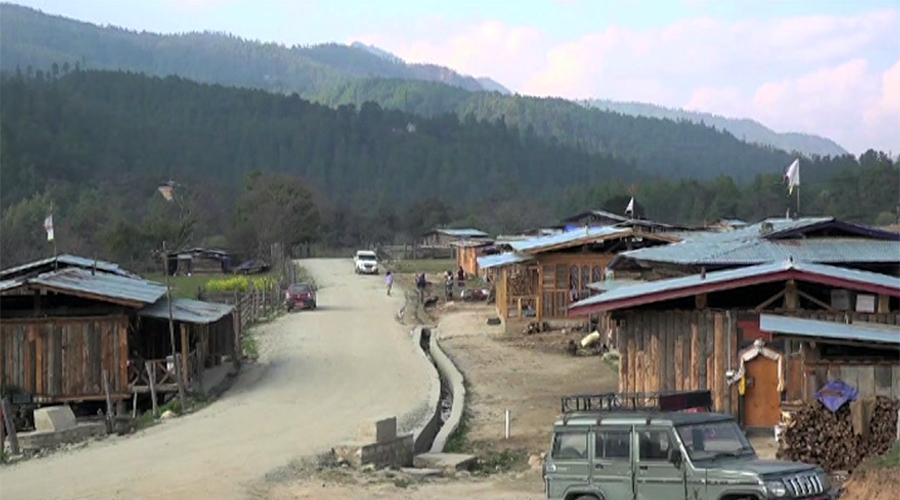
Residents of Khothangkha Chiwog at Ruebisa Gewog in Wangdue Phodrang are seeing what they call some unprecedented developmental activities. They attribute this to the start of one of the Gyalsung Infra Projects in their community. The residents say the project is helping them improve their living standard with better infrastructure. The village which once was on the verge of disappearance is gradually seeing some of its people return home to start their lives all over again with renewed hopes.
 Sheley is one of the most remote villages in Wangdue Phodrang. Located far from the district administration, it remained deserted until a few years ago without proper basic infrastructure.
Sheley is one of the most remote villages in Wangdue Phodrang. Located far from the district administration, it remained deserted until a few years ago without proper basic infrastructure.
The village residents constantly struggled with fluctuating power supply and communication network.
The condition of the farm road used to be so bad that farmers say they had to pull and push power tillers and tractors in summer while transporting agricultural produce to the market.
However, things have changed in the last few years after the initiation of the Gyalsung Infra Project in the village.
New houses are being built and people are setting up businesses. The number of households in Shelley village has increased to 30 from 19.
The power supply in the Chiwog has also improved drastically. And the village residents are now connected with better mobile and road networks.
The number of vehicles has also increased.
Locals say their lives have become comfortable.
The project has helped them get a reliable drinking water supply, and have access to plumbing and electricity wiring services.
The unexpected developmental activities in the village have led to an increase in the price of land. As a result, some villagers who left their land fallow in the past are gradually returning to the village now.
“Earlier, we had to go to a place above Jala village for the mobile network. If not, we have to walk up till Tashi Lakha to get the network. But today, we can access an uninterrupted 4G network in our homes without having to go anywhere. With the start of the GyalSuung project, the mobile network has become so convenient for us,” Karma Dorji, Khothangkha Tshogpa.
“I am doing business after constructing a shop on leased land. My customers are mostly those working for the project. I am earning up to Nu 9,000 a day,” said Namgay Dema, a shopkeeper.
“We send our children to school in GyalSuung project’s school bus. It is convenient for both parents and our children as parents get enough time to work at home while children reach their school on time,” said Thinley Dorji, a resident.
“Project is helping us with their machine to excavate the construction sites. They provide us with machines for other works as well like for constructing water drains and toilet septic tanks. They render us any kind of help as and when we request them,” said Wangchuk, another resident.
Moreover, the project has provided the villagers the much-needed market to sell their vegetables without having to travel outside their village.
Besides, the project has become a source of employment for some.
“The project is also providing an opportunity for some divorcees to work there. Likewise, even our young people are employed with the project. Even my two sons are working with the project as daily wage earners,” said Karma Dorji, Khothangkha Tshogpa.
Apart from that, the project has also helped several religious centres and temples in the community get their road resurfaced which will soon be blacktopped.
“Devoted people used to find it tough to reach our temple due to bad road condition in the past. Likewise, our monks were facing difficulty while going to the hospital. However, with the Gyalsung project, these problems are getting resolved. Our road is already resurfaced with GSB and will soon be blacktopped,” said Khenpo Geser Dorji, the Principal of Rinchhenling Buddhist College in Khothangkha.
More than half of the 30-kilometer-long road from Tekey Zampa to the project is blacktopped. And by the end of this month, the entire stretch of the road will be blacktopped. There are about a hundred households in Khothangkha Chiwog including fifty households from Bjena Gewog currently settled in the Chiwog.
Changa Dorji, Wangdue Phodrang
Edited by Phub Gyem









